第三讲英汉句式对比与翻译讲义
- 格式:docx
- 大小:21.70 KB
- 文档页数:5
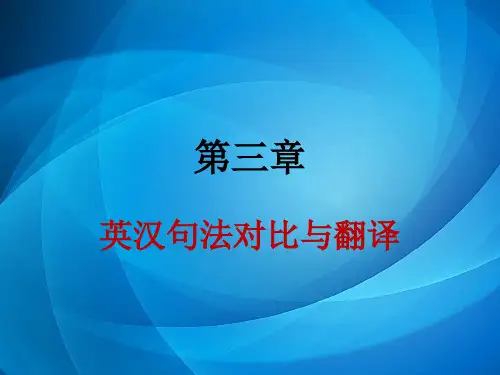
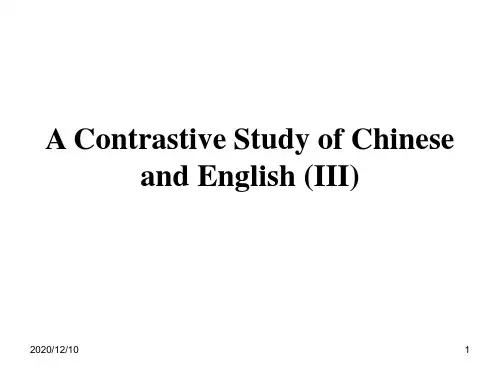
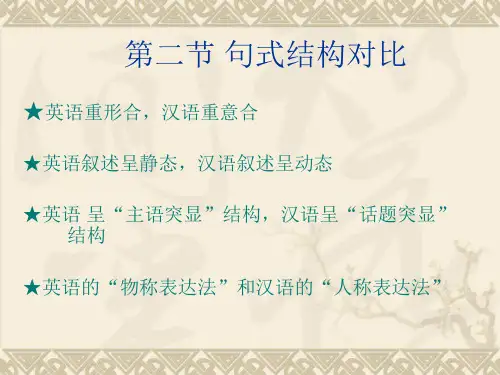
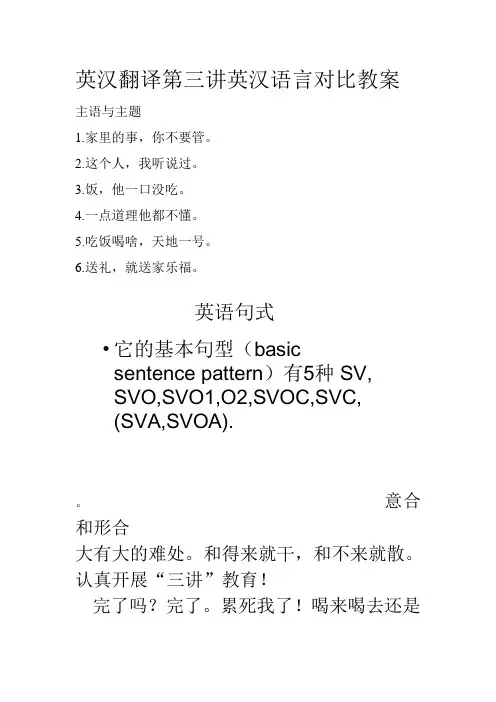
英汉翻译第三讲英汉语言对比教案主语与主题1.家里的事,你不要管。
2.这个人,我听说过。
3.饭,他一口没吃。
4.一点道理他都不懂。
5.吃饭喝啥,天地一号。
6.送礼,就送家乐福。
英语句式•它的基本句型(basicsentence pattern)有5种SV, SVO,SVO1,O2,SVOC,SVC, (SVA,SVOA).意合和形合大有大的难处。
和得来就干,和不来就散。
认真开展“三讲”教育!完了吗?完了。
累死我了!喝来喝去还是金六福好。
好水喝出健康来。
108.嘴甜心苦,两面三刀,头上笑着,脚底下就使绊子,明是一盆火,暗是一把刀,她全占了She’ll give you sweet talk when there’s hatred in her heart, she’s so double-faced and tricky. All the time she’s smiling she tries to trip you up, making a show of great warmth while she stabs you in the back. That’s the way she is.109.大有大的难处。
There are difficulties for VIP or big organizations.110.和得来就干,和不来就散。
If we co-operate well, let’s do it together. If we co-operate well, we will disband.111. 喝来喝去还是金六福好。
My experience of wine-drinking tells me JINLIUFU is the best.112.好水喝出健康来。
Drinking good water results in good health.课外练习【Winners do not dedicate their lives to a concept of what they imagine they should be; rather, the are themselves and as such do not use their energy putting on a performance maintaining pretence, and manipulating others. They are aware that there is a difference between being loving and acting loving, between being stupid and acting stupid, between being knowledgeable and acting knowledgeable. Winners do not need to hide behind a mask】.【Winners are not afraid to do their own thinking and to use their own knowledge. They can separate facts from opinions and don’t pretend to have all the answers. They listen to others, evaluate what they say, but come to their own conclusions. Although winners can admire and respect other people, they are not totally defined, demolished, bound, or awed by them.】【Winners do not play “helpless” nor do they the blaming game. Instead, they assume responsibility for their own lives】.。
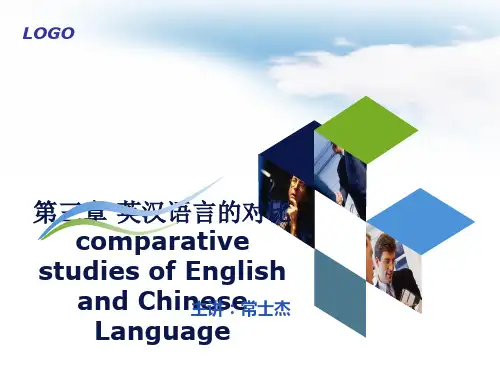
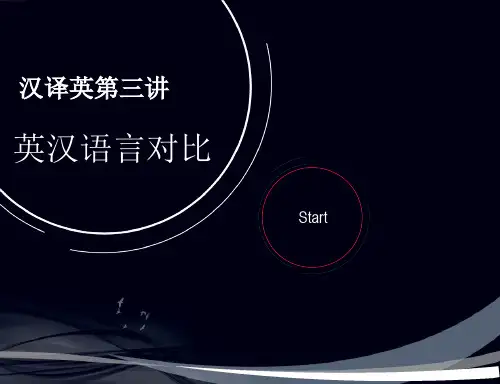
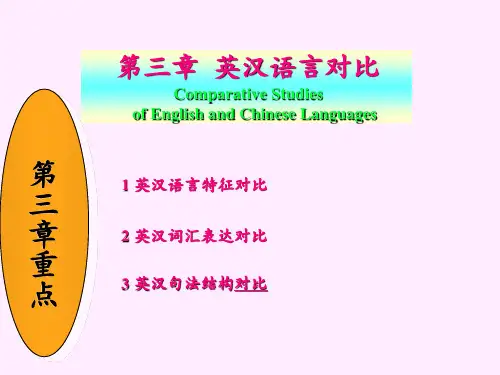
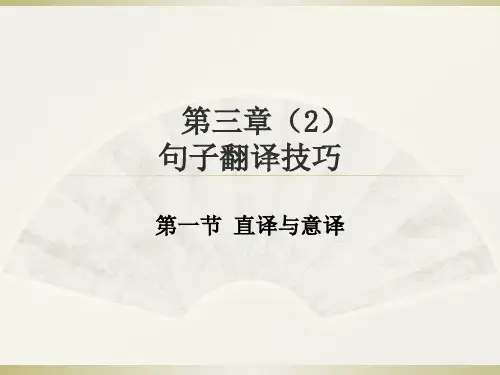
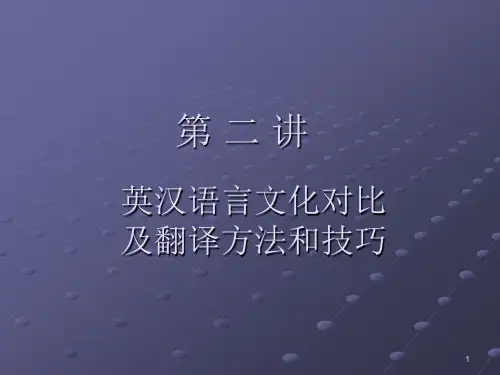
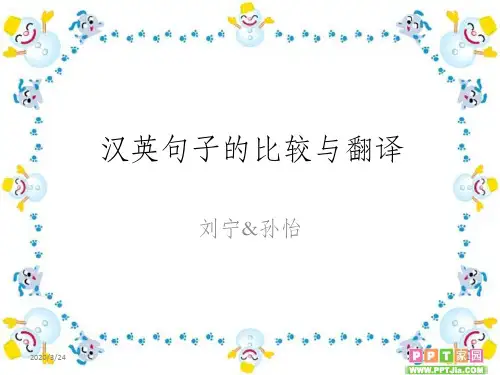
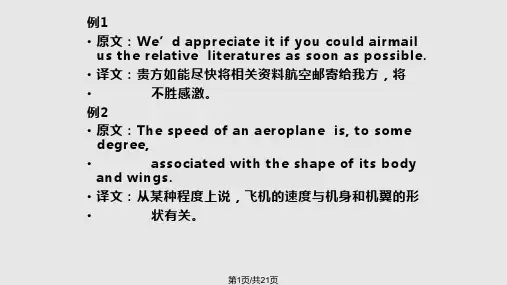
第二讲英汉句式结构对比与翻译如果说词是最小的可以独立运用的意义单位,那么句子是语言的基本运用单位。
一般情况下,进行语篇翻译时,无论是英译汉还是汉译英,基本上都是以句子为翻译单位的。
尤其是英译汉时,即使是一个很长的句子,一般也要将整个句子通盘考虑,搞清整个句子的逻辑关系才能将句子翻译成既能忠实传达原文信息、风格、逻辑关系又能保持通顺的中文。
如果是汉译英,有时句子较长,可以根据意群进行切分,然后将切分开的句子逐句译为英文。
将英汉两种语言的句式结构进行对比,了解两种语言在句式结构上的异同之处,对翻译来说是非常重要的一环。
英文句式结构英文句式结构基本上都可以归纳为主谓结构,即S+V(主语+谓语动词)的结构,即使是祈使句,也不过是省略了主语的句子。
英文的句子结构在S+V的结构上可以扩展,但总不外乎五种基本变化。
(1)S+V:He langhed.(2)S+V+O:Mary is reading Harry Potter.3)S+V+O+O.c.We heard them quarrelling.(4)S+V+I.O+D.CHe gave me some first-hand marerial.(5)S+link.V+PHe is in dangerous situation.以上这些句型充分显示出英文的基本句式结构是主谓结构,而且这是一种高度语法化的句式结构,其中主语一般是动作的发出者(doer\agent)或动作的承受者(doee),即整个句子分别为主动语态和被动语态。
用上述主谓结构来套中文的句子模式,有一部分汉语句子与上述英语句子基本是对应的。
例(1)至(5)的意思,中文也有与英文相似的结构,分别为:(1)C:他笑了。
(2)C:玛丽在读《哈里.波特》。
(3)C:我们听见他们争吵。
(4)C:他给我一些一手资料。
(5)C:他处于危险的境地。
/他处境危险。
二、中文句式结构(一)主谓结构(S + V )例1:他没来。
(S + V )He didin’t come.例2:全家人都在看电视。
(S + V + O)The family are watching TV.例3:我们看到很多人站在广场上。
( S + V + O + O.C )We saw many people standing on the square.例4:你能递给我那本书吗?( S + V + I.O + D.C)Would you please pass me the book?例5:他看上去很失望。
(S + link. V + P)He looks disappointed.(二)汉语的主题—评述句(Topic + Comment [TC] / Theme + Rheme [TR])很多汉语句子都是“话题性”很强的句子,即句子的前面是一个话题,后面是对话题的评述或陈述、描述,用英文表示则为Topic + Comment [TC] 或Theme + Rheme [TR]。
如“他处境很危险”要比“他处于危险的境地”更为通顺,而仔细分析后发现,“他处境很危险”中没有动词,并不是主谓结构,所以分析这样的句子时,一般认为“他”是整个句子的话题,而“处境很危险”则是对“他”进行描述。
例6:大象,鼻子长。
例7:吃,北京很方便。
例8:成百万原来享受免费医疗的城市居民,今后的医疗费用要自己承担一部分。
例9:搞西洋画的,生活环境也应该洋一点。
例10:这些材料我们只能盖一座房子。
例11:楼上住着一个女工。
例12:今晚开会吗?例13:路遥知马力。
例14:中国幅员辽阔,人口众多,物产资源丰富。
例15:出去喝茶,我请你。
以上这些句子中,开头基本上都是要谈的话题,后面跟着对这些话题的评述,与前面讲的( S+V)结构不同。
可以说,这些句子是TC/TR句子。
上述句子中的话题跟其后面的动词不一定有什么关系,或者后面根本就没有动词,如例6、例7、例9和例14。
我们前面讲过,英文句式基本上是S + V 句,那么在将中文TC/TR的句子译成英文时,就需要进行句式结构的调整,在整个句子中找到可以在英文中作主语的词,然后再根据主语选择合适的动词,如果找不到主语,就需要添加主语,或将句中动作承受者作主语,变为英语的被动语态。
上面十个句子分别拟译如下:The elephant has a long nose.Various restaurants are available in Beijing./ It is easy to find various restaurants in Beijing. Millions of urban residdents who were entitled to free medical care will have to pay part of their medical expenses.Those who specialize in Western painting should live in an environment of Western style.We can build only one house with these materials.There lives a woman worker upstairs./A woman worker lives upstairs.Is there a meeting tonight?Distance tests a horse’s strength./ We recognize a horse’s strength after a long distance.China boasts vast land, a large population and abundant resources.I’ll invite you to tea.汉语句子的话题可以是任何要谈的事物、时间、地点、事件、方式等。
综合起来,汉语的主题—评述句(TC/TR)有如下几种:1、动作承受着作话题例16:那件事我已经办好了。
I’ve handled the matter.例17:这个人我见过。
I’ve seen the man somewhere.2、双话题(double topic)例18:我头疼。
I have a headache.例19:这位教授道德高、学问好。
This professor has high morality and broad knowledge.3、动词或动词短语作话题例20:加入世贸组织利大于弊。
China will witness more benefits than losses after its entry into WTO.例21:请客送礼,我从来不会。
I’m never good at giving lavish dinner or gifts(to curry somebody’s favor.)4、从句作话题例22:张三明天去美国,我觉得很奇怪。
That Zhang San is going to the United States tomorrow strikes me strange.\ It strikes me strange that……例23:历史系开会,我可以跟李四提一提。
At the meeting of History Department, I’ll mention it to Li Si.5、地点作话题例24:信封里装不下这些照片。
The envelope can’t hold the photos.例25:桌上搁着一碗饭。
A bowl of rice is on the table.6、时间作话题例26:今天风和日丽。
The wind is gentle and mild and the sun is warm today.例27:这么快就盖好了一栋房子。
The house was built at an admirable speed.中文的话题多种多样,但不管是什么充当话题,在译成英文时,应该考虑到英文的固定句式结构,将句子译为符合英文语法的S+V句子。
(三)无主句(Zero- subject Structure)1、表达客观、公正、科学的语气(科技材料或法律条文)例28:违反法律,就必须受到法律的惩罚。
Those who break the laws must be punished by laws.例29:要制造飞机,就要考虑空气阻力的问题。
Air resistance has to be taken into consideration when an airplane is to be made.(英译时转化为被动语态)2、表达不满但又不是礼貌的语气例30:为什么总把这些麻烦事推给我呢?Why are these troubles always left to me?例31:为什么不直接反映到职能部门去呢?Why is it not reported directly to the competent department?3、省略第一人称主语“我”或“我们”例32:在新的历史时期,要继续发扬尊老爱幼、勤俭节约等中华民族的优良传统。
In the new era, we will carry on traditional Chinese virtues like respecting the old and cherishing the young as well as working hard and being frugal.例33:只有改革创新,才能促进经济社会的快速发展。
Only through reform and innovation can we promote the rapid development of economy and society.(添加)4、一些谚语或哲理的句子谚语是群众生活的结晶,具有相当的普遍性。
许多谚语不必指明动作的发出者,其暗含泛指主语。
英译时根据情况添加泛指主语one 或we,抑或译成there be 结构或it is…+ to do…的结构。
例34:没有调查就没有发言权。
One who makes no investigation has no right to speak./ No investigation, no say.例35:留得青山在,不怕没柴烧。
Where there is a life, there is hope.5、表示存现存现句指表示事物存在、出现或消失的句子。
其中“表示存在、出现或消失的人或事物的名词总是位于谓语动词之后,而表示人或事物存在、出现或消失的处所一般放在句首。